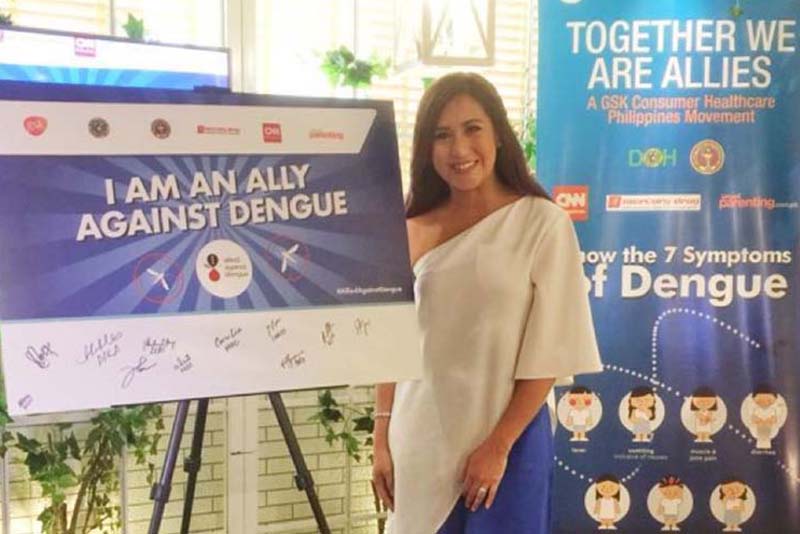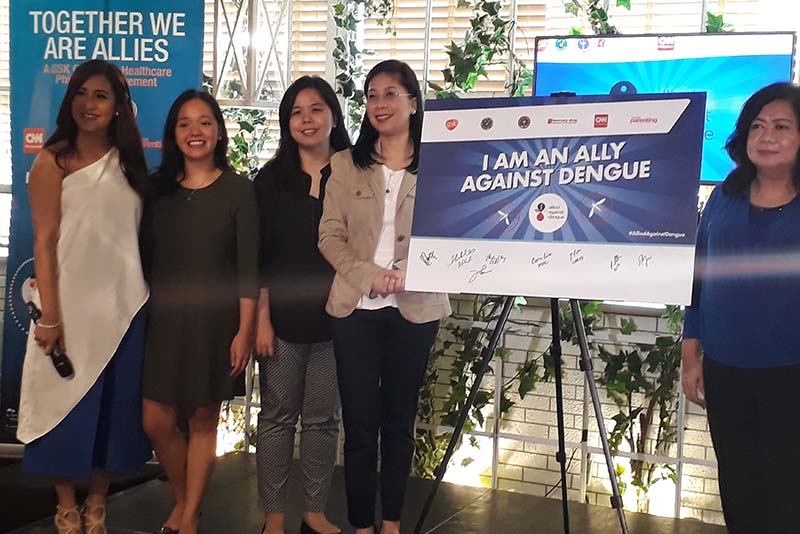#JolinaPH: Jolina Magdangal warns against dengue outbreak

Actress and TV host Jolina Magdangal hosted the recent Alliance Against Dengue launch. Instagram/Jolina Magdangal-Escueta
MANILA, Philippines — Ironically, a day before a typhoon was named after her, actress and TV host Jolina Magdangal hosted the first anniversary of a campaign that reminds Filipinos to be alert against dengue, which peaks during the rainy season.
August to November is the peak of dengue in the Philippines because it is during these rainy days that more stagnant water collects in corners that could breed dengue-bearing mosquitoes, said Dr. Rhodora Cruz of the Department of Health (DOH).
“As a mother, very particular talaga ako when it comes to Pele,” Jolina said.
According to her, since her son was breastfed for two and a half years, he only became sick when he was growing teeth and when he had a tonsillitis-like infection. When Pele had fever, “parang nagunaw mundo ko,” said Jolina.
“Kaya takot ako magkasakit s’ya,” she said on why she is particularly wary of dengue, since her mother-in-law suffered from it while her brother-in-law who had it was in "50/50" condition and had to have a blood transfusion.
“Momshies” like Jolina have a reason to be afraid of dengue because according to DOH:
- Dengue is the fastest growing infection in the world, and it spreads more in the Philippines because of the rainy days. Climate change may be responsible for this increasing trend.
- Dengue remains a critical threat to public health, with about 3.9 billion people in 128 countries at risk of infection with dengue viruses. According to the World Health Organization (WHO) and the International Monetary Fund (IMF), the estimated annual economic burden is $40 billion.
- Ten years back, only seven countries had dengue. But starting last year, it has spread to 120 countries and has affected close to 3.4 million people globally.
- The Americas, Southeast Asia and Western Pacific Regions are the most seriously affected. The Philippines reported 176, 411 suspected cases of dengue (including 422 deaths) in 2016.
- Fifty percent of the world’s population is at risk of dengue. In Asia, in 2012, the Philippines is the number one in incidence.
- According to a study, the Philippines is among the top six Asian countries with the highest dengue cases.
- Dengue in Southeast Asia is taking shape as an epidemic that affects no longer just kids, but everyone of all ages.
- Dengue is endemic in 17 regions and 81 provinces in the Philippines, with Region 7 (Central Visayas) having the highest incidence.
- From January to July this year, all regions registered lower cases except for the National Capital Region, which had a 24.9 percent increase in cases because of the cities’ congestion that make them more susceptible as mosquito breeding grounds.
The good news, said Jolina and Dr. Cruz, is that dengue is 100-percent preventable through:
- Taking a free antigen from your nearest community clinic for the prevention of dengue.
- Taking an anti-dengue vaccination, available for free for kids 9 to 14 years old at community medical centers, particularly in the cities where it is highest (Caloocan, Quezon City, Makati, Manila). Those 9 to 14 are the most affected by the disease.
- The vaccine, said Cruz, is also available in drug stores and pediatricians and must be taken in three doses with a six-month interval per dose. The doctor estimates that the vaccine gives protection for about five years. After five years, she recommends getting booster shots.
- Several types of targeted spraying to kill mosquitoes have been recommended by the World Health Organization. There are also now new technologies for safer vector control.
- From Day 2 to 7, the DOH now recommends going to the hospital starting at Day 1 of experiencing symptoms such as high fever, rashes, vomiting, and nausea. Dr. Cruz monitoring a patient's fever and hydration are key to treating dengue, which still has no cure.
The death rate for dengue is not more than one percent in 2016, which is tantamount to more than 1,000 last year.
“Still, these are deaths,” said Dr. Cruz. “The more dengue we have the more chances for dengue death so we have to continue our fight!”

Jolina (left) with the members of Allied Against Dengue, founded by GSK Consumer Healthcare, which aims to unite all sectors to take action against dengue. Philstar.com/Deni Rose M. Afinidad-Bernardo



















